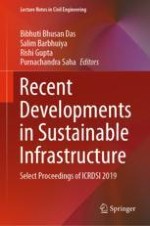2021 | OriginalPaper | Buchkapitel
Time Cost Optimization Using Genetic Algorithm of a Construction Project
verfasst von : Paromik Ray, Dillip Kumar Bera, Ashoke Kumar Rath
Erschienen in: Recent Developments in Sustainable Infrastructure
Verlag: Springer Singapore
Aktivieren Sie unsere intelligente Suche, um passende Fachinhalte oder Patente zu finden.
Wählen Sie Textabschnitte aus um mit Künstlicher Intelligenz passenden Patente zu finden. powered by
Markieren Sie Textabschnitte, um KI-gestützt weitere passende Inhalte zu finden. powered by
